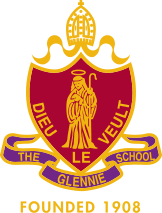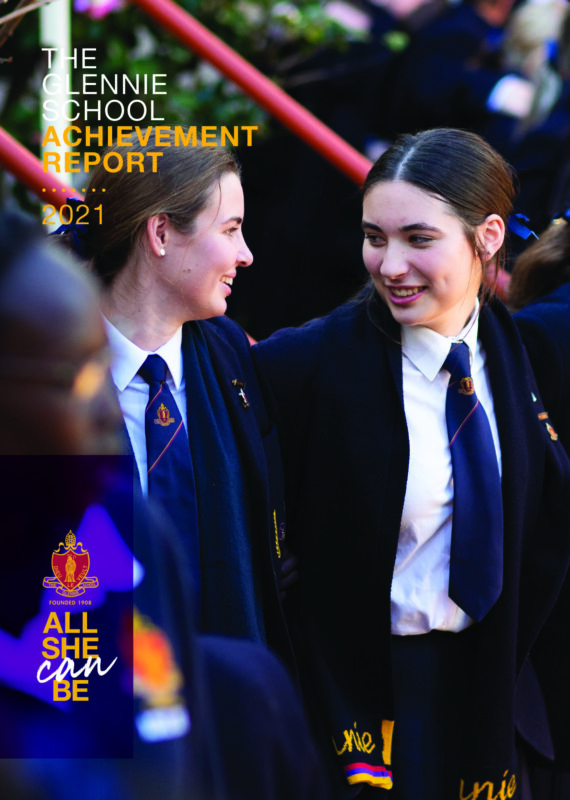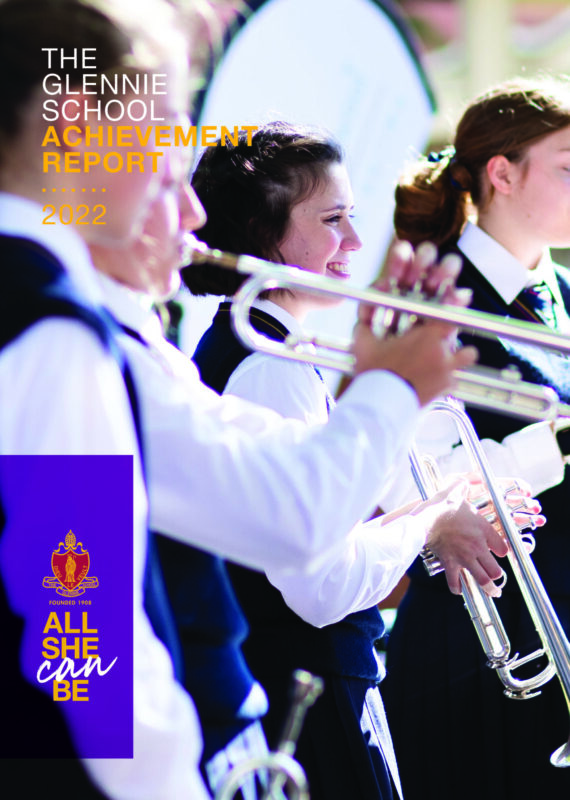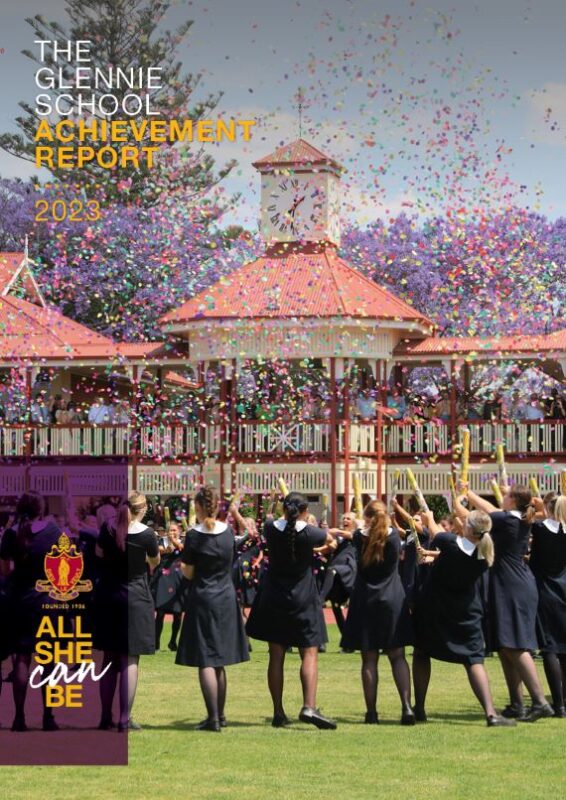Developing women of character
At Glennie, we recognise each student has a range of unique abilities that require nurturing. In this fast-paced world, with new opportunities and challenges emerging every day for young women, our philosophy is to develop each student’s personal character in order to prepare her for life.
Educating the whole girl is an important part of Glennie’s offering. We teach resilience, teamwork, leadership, spiritual awareness and courage. Programs that promote positive mental health, physical health and the social and emotional wellbeing of students are central to what we are trying to achieve. Courses that provide students with critical thinking and problem solving skills and stimulate their creativityreinforce this goal.
Every lesson, in every learning area, presents an opportunity for teachers to explicitly teach and underline the core values of our school. Students are taught to show concern for others and help those in need (compassion); actively listen and interact with manners (respect); be truthful to themselves and others (integrity); and have the conviction to set meaningful goals and stand for their beliefs (courage). The aim for each Glennie learner is to be curious and open minded, collaborative and resourceful, and step outside of her comfort zone and take risks in order to grow and learn.
Through the different Learning Areas
English and Humanities
In English, character education is embedded in each unit, especially novel studies. Students are often required to write reflective pieces based on ideas and issues explored within the stimulus text. Literary texts underpin the English program and facilitate an exploration of human nature and human conditions. Through discussions of flawed or complex characters, students reflect on their responses (attitudes, value and beliefs). The Humanities develops students’ sensibilities through studying human culture and condition. Utilising the inquiry process, students strive to understand who they are as people, our identity as a society and how society can be transformed.
French Immersion Program
Participants learn to understand and embrace French culture and also other cultures through their lessons and teachers. For example, the program’s teachers also have German and Peruvian heritage. Students accept and value cultural differences. They become curious, open-minded and eager to learn. French Immersion girls support each other and celebrate the achievements of their peers.
They organise study groups and develop resources – mock examinations, for instance – that support collective learning. They also develop rigorous study routines and habits of mind. Many are heavily involved in co-curricular activities, and by striving for excellence in all areas, they develop the capacity for perseverance.
Wellbeing Program
Through the Wellbeing Program, students connect with their peers and members of their House in recognition that inter-year friendships allow for positive role modelling to occur. Character education is explicitly taught in the My Character Strengths and Standing out Above the Crowd units of work.
STEAM (Science, Technology, Engineering, The Arts and Mathematics)
Critical thinking, problem solving and innovation are synonymous with STEAM. Students learn to think big, become resilient as problem solvers and take risks. They learn to move away from correctness and conformity in order to test hypotheses and challenge existing thoughts.
Performing Arts, HPE and Sport
The Performing Arts, HPE and Sport offerings at Glennie are excellent vehicles for the development of each individual and her character traits. The pursuit of success, be it on the sporting field or the stage, takes grit, resilience and self-discipline. Coaches, tutors and instructors use activities to promote team cohesion and positive character development. Being a member of a team, group or ensemble develops communication skills, patience, fairplay, team spirit, conflict management, negotiation skills and leadership capacity. In success, participants develop confidence, and with each loss they learn humility and the ability to face adversity with grace.
Religious Education
RE develops the building blocks of each student’s character and develops their practical wisdom so that they can flourish as individuals, and in turn, contribute to a better society. Students explore questions around seven areas: origins, destiny, identity, meaning, purpose, value and authority. The RE course at Glennie is divided into 3 subjects: Religious and Values Education in Years 7 – 9, Ethics, Philosophy and Religion in Years 10 – 12, and an additional stand-alone subject, Philosophical Inquiry, in Year 8.
Year 7: The Year 7 RAVE program focuses on learning about and learning from the Christian religion. Unit 3 explores specifically the traditions and history of The Glennie School, Anglicanism and how our values relate to the teachings of Jesus. Character focus: compassion, faith, values.
Year 8: Students begin with studying Judaism and then religious persecution. In Unit 3, they explore the concept of indifference and how to ensure we are not responding indifferently to important events and circumstances in our lives. Character focus: indifference, respect, courage, understanding others.
Year 8 PI: In Philosophical Inquiry, students explore units on identity, belief and knowledge, time and philosophical dilemmas. Character focus: reflective thinking, integrity, deep listening, respect for ideas.
Year 9: Students look at the idea of vocation and spirituality, how we can be guided and shaped by particular world views and expressions of faith. Character focus: spirituality, respect for difference, vocation.
Year 10: The course introduces students to more formal study in ethics and philosophy and how these relate to religion. Each unit assists students in developing their own perceptions, interactions and character, by investigating topics such as heroes and role models, good vs evil, forgiveness and social justice. Character Focus: care, forgiveness, right actions.
Year 11: Students begin with an in-depth study of the concept of peace across religions and the world, answering the question “how can we live a more non-violent life?” They then look at the ethics of science and technological advancements, with the overarching question “we can do these things – should we?” The course finishes with an exploration of free will and determinism. Character focus: ethics, peace, life choices.
Year 12: This is a culmination of all that students have studied in RAVE and EPR. Each unit focuses on a particular aspect of life. The Sacredness of Life explores ethical decisions around crime and punishment, capital punishment, euthanasia, end-of-life care and abortion. Unit 2 asks the question “What is the meaning of life?”, what is our purpose, how should we operate in the world? Finally, students prepare for the next stage in their life’s journey by exploring the “Legacy of Life” – what does it mean to leave a legacy, what shapes them as a person. Character focus: purpose, destiny, philosophy of life.
“Glennie girls are unapologetically themselves and embrace others for being so as well, they work hard when necessary but are just as sure to have fun throughout every day.”
Through Programs and Activities
Students have access to a large selection of programs and activities that are designed to develop their character. A sample of these include:
Service: Cross-campus visits, Big Sister-Little Sister Program, The Interyear Program (TIP), Be of Service Program, and The Environmental Club.
Leadership: All student committees. E.g. The Student Welfare Committee and The Student Representative Committee.
Competitions and Excursions: MOOT Court, Debating, Ethics Olympiad, and Readers Cup.
Special Events: Rankin Leaders Dinner, Mayoral Breakfast and guest talkback radio appearances.
Camps: Years 7 to 11 camps, each with a unique character development focus. E.g. Courage, adventure, leadership.





